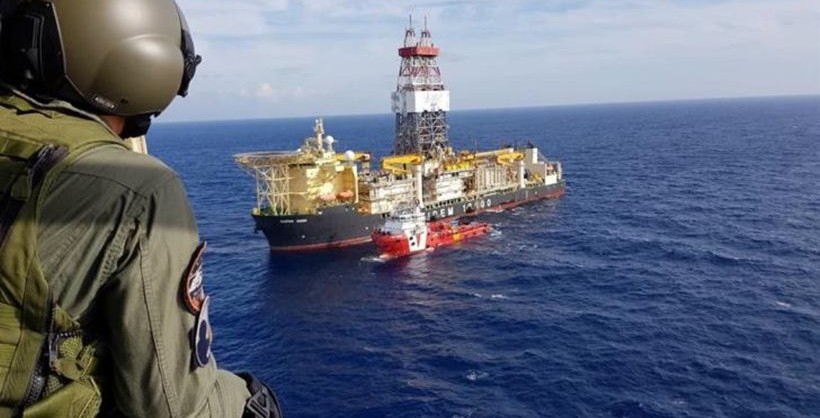
Turkish warships blocked an Italian ship contracted by the Italian energy conglomerate Eni that was heading toward Cyprus to begin exploring for natural gas, marking the first time in recent history that Turkey has actively blocked passage of a European ship.
Greek Cypriot Foreign Minister Ioannis Kasoulides told state broadcaster RIK that the rig has halted its journey heading south of the island and was waiting for directions from ENI. He said Greek Cypriot authorities are in contact with the company and the Italian government.
The EU warned Turkey on Monday (12 February) to refrain from any "threat" against Cyprus, after a Turkish vessel prevented an Italian ship from reaching a drilling zone for gas off the Cypriot coast. In response, Italy sent one of its frigates (which was already scheduled for deployment for pre-planned NATO exercises) to patrol Cyprus’ exclusive economic zone, although its captain was reportedly ordered to avoid direct confrontation with the Turkish vessels blocking Eni’s drilling rig.
On Tuesday, Turkish Prime Minister Recep Tayyip Erdogan issued a firm warning to the Republic of Cyprus. “We warn those who overstep the mark in Cyprus and the Aegean,” he said. "We recommend that foreign companies don't allow themselves to be an instrument of issues that surpass their limits and strength, by trusting the Greek Cypriot side . . . Their show of strength lasts only until they see our ships and our planes."
Cyprus, which sits about 50 miles (80 kilometers) off Turkey’s southern Mediterranean coast at its closest point, was part of the Ottoman Empire from 1571 until the empire’s collapse after World War I. Before 1571, Cyprus was held by the Italian city-state of Venice, which exposed the Ottomans to the presence of a foreign power. At the time, Venice was a wealthy, merchant city-state that, while not particularly powerful on land, had one of the most formidable navies in Europe. The Ottomans did not have to worry about the risk of a land invasion from Venice, but the Venetian stronghold on Cyprus did pose a major threat to Ottoman shipping and trade. The Ottomans needed to maintain open supply lines to northern Africa, which they depended on for much of their trade and therefore wealth, and Venice frequently used its position on Cyprus to disrupt these trade routes. When the Ottomans invaded the island in 1571, the war that resulted between a European coalition (the Holy League) and the Ottomans saw one of the largest naval battles in history and the largest confrontation of galleys (boats powered by oar) in modern history. While naval battles are no longer fought by boats powered by oars, Cyprus’ location still poses strategic risks to Turkey’s position in the Eastern Mediterranean.
If Cyprus were to open its doors to Western Europe to take advantage of its newfound resources, Turkey would then be faced with a situation in which countries far more powerful than Greece have vested economic interests in the island that depend on Turkey’s exclusion. In order to stop that Turkey must have control of the Eastern Mediterranean.
The current confrontation is unlikely to lead to imminent conflict between Turkey and Western Europe. But it is significant incident since Turkey since I World War has demonstrated its ambitions via military blockage against to EU.
Turkey might hope that this incident might iginte the peace talks between two sides. Thus would lead a plan to transport the gas to EU market. However if EU would come together and show a stance against Turkey then Ankara will face with difficult choices.
If Turkey wants to sustain its position, Turkey has to recover its economy which depends on EU and US greatly. Unless this happen, Turkey will be exposed to foreign interests.

